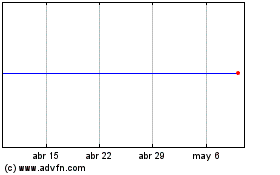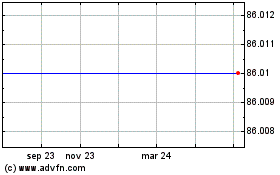Honeywell, United Tech Spar Over Takeover Offer--3rd Update
26 Febrero 2016 - 5:04PM
Noticias Dow Jones
By Austen Hufford and Ted Mann
Honeywell International Inc. and United Technologies Corp. duked
it out on Friday, attempting to rally shareholder support as their
discussions over a potential $90.7 billion merger spilled into the
open.
Honeywell unveiled the details of its proposal, making the case
for merging two of America's largest industrial companies and
seeking to ratchet up pressure to negotiate a deal. United
Technologies responded hours later with its own public filing
rejecting the deal and reiterating its concerns about any
combination being able to survive regulatory scrutiny.
The competing arguments suggest Honeywell will continue to push
hard for a deal; the ultimate outcome of the takeover battle may be
decided by how well each company makes its argument to
investors.
Honeywell said its offer, which it first made privately last
week, valued United Technologies at about $108 a share, including
$42.63 in cash and 0.614 of a Honeywell share. The Wall Street
Journal had reported terms of the offer earlier this week, citing a
person familiar with the matter.
But its 10-page presentation doesn't address how Honeywell would
surmount what United Technologies says is the primary obstacle--the
likely objections of antitrust regulators to the combination of two
major aerospace equipment suppliers.
In a letter released to investors Friday, United Technologies
CEO Gregory Hayes repeatedly pointed to regulatory risk, saying the
merger wouldn't get approved due to an environment that "is the
most aggressive toward megadeals in decades." Even if a deal were
approved, he argued that the required delays and divestitures would
far outweigh any benefits and potential synergies.
The company was dismissive, too, of the deal's structure, which
would use some cash from United Technologies' balance sheet to fund
the transaction. "Effectively Honeywell's proposal is a leveraged
buyout of UTC using UTC's own strong balance sheet," Mr. Hayes
wrote.
Honeywell believes that any objection from regulators in the
U.S. or Europe could be dealt with through relatively simple
divestitures. Aerospace businesses where the two companies
currently overlap, like production of electrical power units for
aircraft, could be sold off to satisfy government concerns about
creating a monopoly.
One major investor in both companies said the merger wouldn't be
as difficult to complete as United Technologies and Mr. Hayes
suggest.
"It seems to me there could be a path to approval," said Tobias
Welo, portfolio manager for Fidelity Management & Research Co.,
which is the eighth-largest shareholder at United Technologies and
11th-largest at Honeywell.
"In industrials, there's a path forward if you're willing to
divest the assets," Mr. Welo said. "You just have to make sure the
deal still makes economic sense."
This week, Honeywell CEO David Cote has been on the road,
including visiting with investors in Boston to make his case on the
merits of the deal. Mr. Welo said Honeywell is taking a similar
tack to other industrial companies that have used a year of
slumping valuations as an opportunity to snap up competitors at low
prices.
United Technologies has pushed the opposite case, focusing
especially on the mammoth customers most likely to oppose a merger
of key aerospace suppliers: Airbus Group SE and Boeing Co. On
Wednesday, both plane-makers expressed reservations about the
potential merger.
United Technologies said the two companies are head-to-head
competitors in many aerospace and building systems business lines,
pointing to small and medium aircraft engines, wheels and lighting,
among others.
On Friday, United Technologies warned that U.S. and European
regulators aren't the only ones who would have to bless the merger.
China in particular could prove a challenge, since the country
might require that some aerospace assets be sold to a Chinese
buyer. Such a sale could trigger its own national security review
in the U.S., the company suggested.
In its presentation, Honeywell said the combined company will
have "highly complementary" offerings that also have limited
overlap. According to Honeywell, potential regulatory issues would
be "easily resolved."
Honeywell argues that a combined company would retain an
investment-grade credit rating, another nod to possible shareholder
concerns. And it makes clear that what was discussed months ago as
a merger of equals is now a takeover. Honeywell's Mr. Cote would
run the new company as both chairman and chief executive.
Shares of Honeywell fell 1.1% to $103.03, while United
Technologies slipped 38 cents to $97.69.
Write to Ted Mann at ted.mann@wsj.com and Austen Hufford at
austen.hufford@wsj.com
(END) Dow Jones Newswires
February 26, 2016 17:49 ET (22:49 GMT)
Copyright (c) 2016 Dow Jones & Company, Inc.
United Technologies (NYSE:UTX)
Gráfica de Acción Histórica
De Sep 2024 a Oct 2024

United Technologies (NYSE:UTX)
Gráfica de Acción Histórica
De Oct 2023 a Oct 2024
